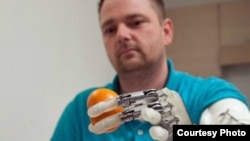A Danish man is the first amputee in the world to have sensation in his artificial hand thanks to a prosthetic that was surgically wired to the nerves in his upper arm. The accomplishment represents a tremendous leap forward for individuals with artificial limbs.
Nine years ago, Dennis Aabo Sorensen lost his hand while launching fireworks. Since then, he has used a prosthesis for grasping objects.
Now, thanks a sensory-enhanced artificial device attached to the nerves in his upper arm, Sorensen has a bionic hand that can feel the objects he touches in real time.
“I could feel round things and hard things and soft things, and the feedback was totally new to me. And suddenly when I was doing some movements; I could feel what I was doing instead of actually looking at what I was doing," said Sorensen.
Researchers in Italy and Switzerland developed the revolutionary feedback system last year.
The robotic-looking hand has sensors attached to the artificial tendons of each finger that control movement. The fingers are connected to wires attached to four electrodes that were surgically implanted into what remains of Sorensen’s upper arm nerves.
The sensors detect how much force Sorensen is using to grasp objects. A computer algorithm converts that information into a mild electrical impulse that his sensory nerves and brain can interpret. The result is a prosthetic device that can feel.
In experiments in which Sorensen was blindfolded and wore earplugs, he was able to detect how strongly he was grasping the different objects he picked up, as well as their shape and smoothness.
Stanisa Raspopovic, of the Ecole Polytechnique Federale in Switzerland, was the study's lead researcher.
“All of this was happening intuitively and without particular training, which is astonishing. Why is that happening? Because it is physiologically implausible, close to natural," said Raspopovic.
Researchers say a sensory-enhanced prosthetic is years away from being available to the public. The next step, according to Raspopovic, involves fine-tuning the hand by making it fully portable and giving the wearer a finer sense of touch.
The researchers describe their work in the journal Science Translational Medicine.
Nine years ago, Dennis Aabo Sorensen lost his hand while launching fireworks. Since then, he has used a prosthesis for grasping objects.
Now, thanks a sensory-enhanced artificial device attached to the nerves in his upper arm, Sorensen has a bionic hand that can feel the objects he touches in real time.
“I could feel round things and hard things and soft things, and the feedback was totally new to me. And suddenly when I was doing some movements; I could feel what I was doing instead of actually looking at what I was doing," said Sorensen.
Researchers in Italy and Switzerland developed the revolutionary feedback system last year.
The robotic-looking hand has sensors attached to the artificial tendons of each finger that control movement. The fingers are connected to wires attached to four electrodes that were surgically implanted into what remains of Sorensen’s upper arm nerves.
The sensors detect how much force Sorensen is using to grasp objects. A computer algorithm converts that information into a mild electrical impulse that his sensory nerves and brain can interpret. The result is a prosthetic device that can feel.
In experiments in which Sorensen was blindfolded and wore earplugs, he was able to detect how strongly he was grasping the different objects he picked up, as well as their shape and smoothness.
Stanisa Raspopovic, of the Ecole Polytechnique Federale in Switzerland, was the study's lead researcher.
“All of this was happening intuitively and without particular training, which is astonishing. Why is that happening? Because it is physiologically implausible, close to natural," said Raspopovic.
Researchers say a sensory-enhanced prosthetic is years away from being available to the public. The next step, according to Raspopovic, involves fine-tuning the hand by making it fully portable and giving the wearer a finer sense of touch.
The researchers describe their work in the journal Science Translational Medicine.







